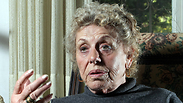
The 'politically incorrect' politician
Op-ed: Shulamit Aloni chose not to be a populist. The only people she fought against were the enemies of democracy
Here is what Shulamit Aloni chose not to be: She was not a populist. She was not popular, not postmodern, not a radical feminist, and certainly not "politically correct"; her language was not politically proper. She resisted the temptation to be either of these. A huge temptation.
At the very beginning of her public life, Aloni became immunized against the lethal populism bug, which infiltrates the Israeli Left's respiratory system and soul. She was unfamiliar with its main characteristics, the conspiratorial perception of reality and attributing the problems in it to the activity of hidden groups allegedly exposed by the populists.
Her struggle to strengthen democracy lacked any populist characteristics. She didn't incite against "tycoons," nor against "committees," "career officers" or "haredim." The only people she fought against were the enemies of democracy, whoever they may be. The proposals she raised in the area of civil rights were always complex, reasoned and based on the experience of other advanced Western countries. Her social-economic ideal was a modern Western welfare state. Not Juan Perón's Argentina but Olof Palme's Sweden, Tony Blair's Britain.
Precisely because she rejected populism altogether, Shulamit Aloni did not gain much popularity. Sticking to her principles, she didn't hesitate to give up on an education minister's career in 1993 in order to save the "Oslo coalition." She later distanced herself from institutionalized politics. She learned to live with the recognition that the wide public would not be grateful to her for her activity in favor of the public. The ingratitude made her bitter but she did not hate, did not become desperate or submissive to the audience's demands.
Aloni went on in her independent way and did not measure her success according to the number of times she appeared on radio and television talk shows. In her books, in her articles, in her speeches, Aloni unequivocally expressed her full faith in the complete precedence of the truths included in the Declaration of Human and Civil Rights. She didn't doubt liberal values for a minute; she was far off from the relativism of values, which defines postmodernism. She didn’t confuse the understanding of the other's perceptions with accepting them. She wanted to see the Israeli culture as diverse as possible, and in this respect she supported multiculturalism.
In other aspects, more important ones, Aloni renounced multiculturalism which leads to forgiveness towards incitement and hatred, to denial of absolute ethical standards and to granting the achievements of science and superstitions an equal status, as if there is no clear decision between them. Aloni thought there was such a decision, which led to quite a few clashes with different circles, from haredim to postmodernists.
With all her might, Aloni fought for grating equal rights to women in all areas of life in Israel and for enacting laws which would define the discrimination against them as a crime (her life altering book, "Women as Human Beings," is highly recommended), but she fought just as powerfully to correct the status and maintain the natural rights of society's other weak groups: The Arabs, the poor, the homeless, the voiceless, the non-Jews according to Halacha, the homosexuals, the lesbians, the foreign workers, the asylum seekers.
The rejection of zealotry led Aloni to reject feminism as well as a worldview which sees reality only through the gender lens. The sentence "regardless of religion, race, age or gender" was her guiding principle throughout her entire life.
And finally, it's obvious that Aloni was not "politically correct." The political correctness in the discourse and opinion played no role in her life, and that annoyed and angered so many people. Those eulogizing her should also remember that.










